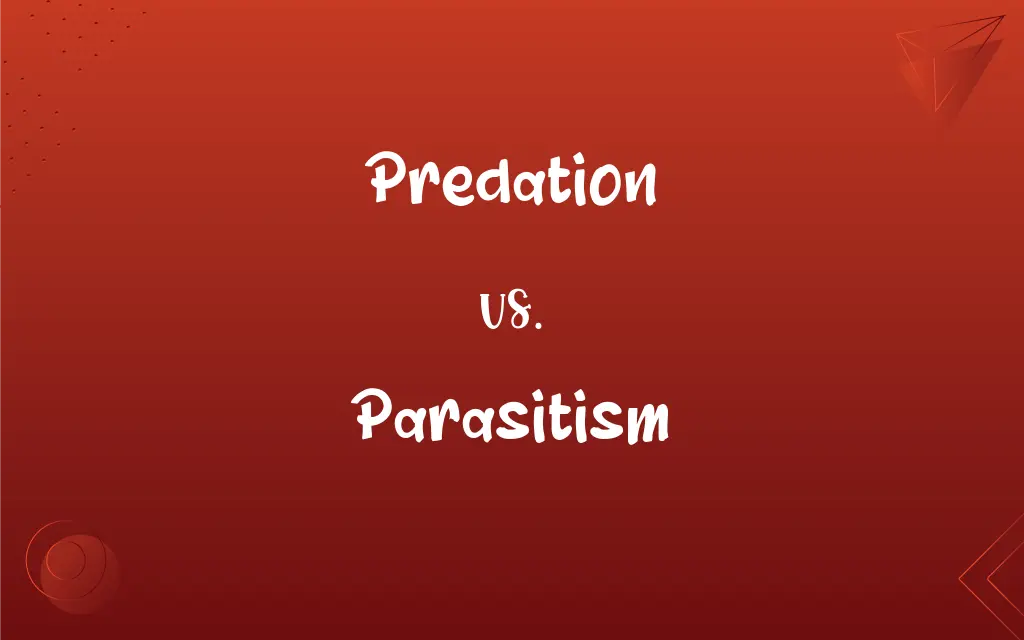Predation vs. Parasitism: What's the Difference?
Edited by Aimie Carlson || By Harlon Moss || Updated on October 27, 2023
Predation is an interaction where one organism (predator) kills and eats another (prey). Parasitism is a relationship where one organism (parasite) lives on or in a host, harming but usually not killing it.

Key Differences
Predation involves a predator killing and consuming its prey, directly affecting population dynamics. Parasitism, however, involves a parasite living off a host, often causing harm but not immediate death.
In predation, the predator-prey relationship typically results in the death of the prey. In parasitism, the parasite-host relationship allows both to survive, though the host may suffer harm.
Predators are usually larger than their prey and engage in active hunting or trapping. Parasites are often smaller than their hosts and rely on them for nutrients, often living on or inside them.
Predation plays a crucial role in controlling prey populations and maintaining ecological balance. Parasitism can lead to host diseases but also contributes to ecological balance by controlling host populations.
Predators are independent and their survival depends on successfully capturing prey. Parasites depend on their hosts for survival, often having complex life cycles involving multiple hosts.
ADVERTISEMENT
Comparison Chart
Relationship Result
Typically results in the death of the prey.
Host survives but may be harmed.
Size Relationship
Predator is usually larger than the prey.
Parasite is usually smaller than the host.
Dependency
Predator is independent.
Parasite depends on the host.
Survival Strategy
Involves hunting or trapping.
Involves living on or inside the host.
Ecological Role
Controls prey populations.
Controls host populations, can cause diseases.
ADVERTISEMENT
Predation and Parasitism Definitions
Predation
Predation refers to the predator-prey relationship where the predator kills the prey for food.
The predation of hawks on mice helps regulate the rodent population.
Parasitism
Parasitism involves one organism living on or inside another, deriving nutrients and causing harm.
The parasitism of tapeworms in the human intestine is a concern for health.
Predation
Predation is the act of one organism hunting and consuming another organism.
The lion's predation on gazelles is a classic example in the savanna ecosystem.
Parasitism
Parasitism is a symbiotic relationship where one organism benefits at the expense of another.
The parasitism of ticks on dogs can lead to various health issues.
Predation
Predation is an ecological interaction where one species benefits by feeding on another.
The predation of wolves on deer shapes the forest ecosystem.
Parasitism
Parasitism is a biological interaction where a parasite lives off a host organism.
The parasitism of mistletoe on trees can stunt the tree's growth.
Predation
Predation is the process of capturing and consuming other organisms for sustenance.
The predation of orcas on seals is a display of nature's food chain.
Parasitism
Parasitism is a relationship where an organism derives food and shelter from its host.
The parasitism of fleas on cats is an example of external parasitism.
Predation
Predation involves a biological interaction where a predator species feeds on a prey species.
In marine environments, shark predation is vital for ecological balance.
Parasitism
Parasitism occurs when one organism depends on another for survival, usually to the host's detriment.
The parasitism of lice on humans is a common issue.
Predation
The capturing of prey for food.
Parasitism
A relationship between two organisms of different species in which one is a parasite and the other is a host.
FAQs
Are all parasites harmful?
Most cause some harm, but some have mutual benefits with their host.
Can parasitism evolve into mutualism?
In some cases, the relationship can evolve.
Can predation lead to extinction?
If unbalanced, it can contribute to the decline of prey species.
Do predators always eat their prey?
Predation usually involves consuming the prey.
Can predation be beneficial?
Yes, it helps control prey populations and maintain ecological balance.
Can a parasite have multiple hosts?
Yes, some have complex life cycles involving several hosts.
What is parasitism?
Parasitism is a relationship where one organism lives off another, harming it.
Are all predators large animals?
No, predators come in various sizes.
Can plants be parasites?
Yes, some plants like mistletoe are parasitic.
Do predators only hunt live prey?
Most do, but some scavenge for dead animals.
Do predators only hunt for food?
Primarily, though there can be other reasons.
What is predation?
Predation is when one organism hunts and eats another.
Do parasites kill their hosts?
Generally, they harm but don't immediately kill their hosts.
Are parasites always smaller than hosts?
Typically, but there are exceptions.
Can predation help biodiversity?
Yes, by controlling species populations.
Do all parasites transmit diseases?
Many do, but not all.
Is a spider catching flies predation?
Yes, it's a classic example of predation.
Can parasitism be temporary?
Yes, some parasites only associate with the host temporarily.
Is predation natural?
Yes, it's a natural ecological process.
Can humans be hosts in parasitism?
Yes, humans can host various parasites.
About Author
Written by
Harlon MossHarlon is a seasoned quality moderator and accomplished content writer for Difference Wiki. An alumnus of the prestigious University of California, he earned his degree in Computer Science. Leveraging his academic background, Harlon brings a meticulous and informed perspective to his work, ensuring content accuracy and excellence.
Edited by
Aimie CarlsonAimie Carlson, holding a master's degree in English literature, is a fervent English language enthusiast. She lends her writing talents to Difference Wiki, a prominent website that specializes in comparisons, offering readers insightful analyses that both captivate and inform.































































